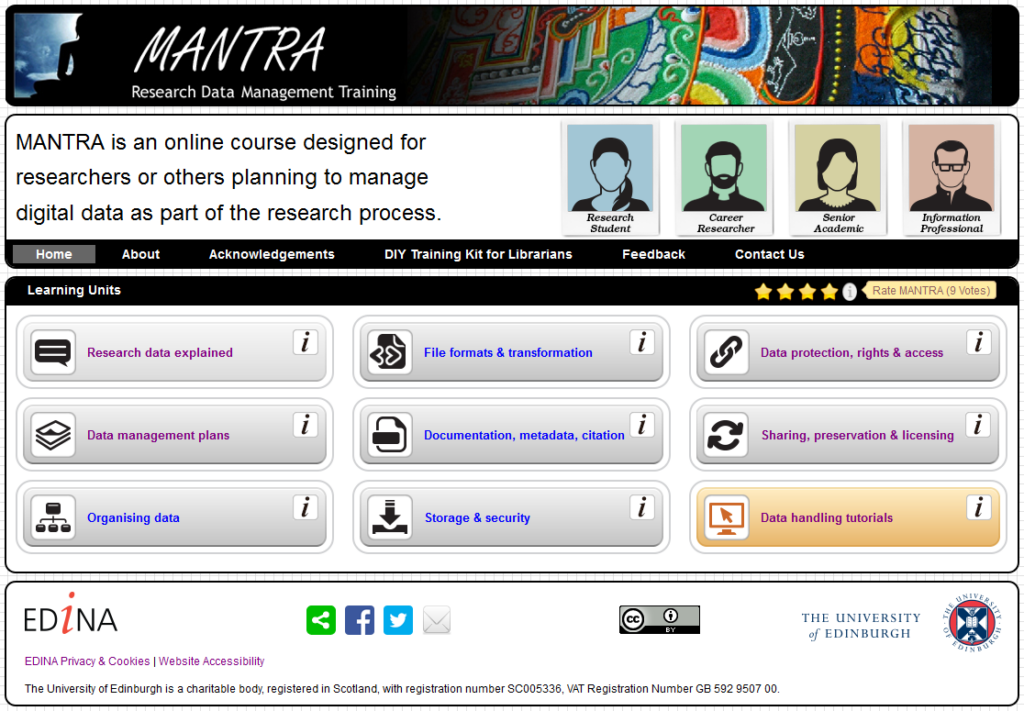The Research Data MANTRA course is an open, online training course that provides instruction in good practice in research data management. There are nine interactive learning units on key topics such as data management planning, organising and formatting data, using shared data and licensing your own data, as well as four data handling tutorials with open datasets for use in R, SPSS, NVivo and ArcGIS.
This fourth release of MANTRA has been revised and systematically updated with new content, videos, reading lists, and interactive quizzes. Three of the data handling tutorials have been rewritten and tested for newer software versions too.
New content in the online learning modules with the September, 2014 release:
- New video footage from previous interviewees and introducing Richard Rodger, Professor of Economic and Social History and Stephen Lawrie, Professor of Psychiatry & Neuro-Imaging
- Big Data now in Research Data Explained
- Data citation and ‘reproducible research’ added to Documentation and Metadata
- Safe password practice and more on encryption in Storage and Security
- Refined information about the DPA and IPR in Data Protection, Rights and Access
- Linked Open Data and CC 4.0 and CC0 now covered in Sharing, Preservation & Licensing
 This release will also be more stable and more accessible due to back-end enhancements. The flow of the learning units and usability of quizzes have been improved based on testing and feedback. We have simplified our feedback form and added a four-star rating button to the home page. A YouTube playlist for each unit is available on the Data Library channel.
This release will also be more stable and more accessible due to back-end enhancements. The flow of the learning units and usability of quizzes have been improved based on testing and feedback. We have simplified our feedback form and added a four-star rating button to the home page. A YouTube playlist for each unit is available on the Data Library channel.
MANTRA was originally created with funding from Jisc and is maintained by EDINA and Data Library, a division of Information Services, University of Edinburgh. It is an integral part of the University’s Research Data Management Programme and is designed to be modular and self-paced for maximum convenience; it is a non-assessed training course targeted at postgraduate research students and early career researchers.
Data management skills enable researchers to better organise, document, store and share data, making research more reproducible and preserving it for future use. Researchers in 144 countries used MANTRA last year, which is available without registration from the website. Postgraduate training organisations in the UK, Canada, and Australia have used the Creative Commons licensed material in the Jorum repository to create their own training. The website also hosts a ‘training kit’ for librarians wishing to increase their skills in supporting Research Data Management.
Visit MANTRA and consider recommending it to your colleagues and research students this term! http://datalib.edina.ac.uk/mantra/
Usage Statistics
According to Google Analytics, the following organisation’s websites were the top ten referrers to the MANTRA website for the academic year 2013-2014 (discounting Data Library, EDINA and Information Services):
- Institute for Academic Development, University of Edinburgh
- LIS Links (India)
- Digital Curation Centre
- eScience Portal for New England Libraries at University of Massachusetts Medical Library
- Oxford University
- University of Nebraska-Lincoln (USA)
- Carleton University (Canada)
- Glasgow University
- Food and Agriculture Organization of the United Nations
- Jisc
Social media sites Facebook, Twitter and Slideshare provided a large number of referrals; several more came from other UK institutions, and HEIs in Australia, the rest of Europe, and North America—University Library pages especially. Forty percent of sessions came from a referring website.
Visitors to MANTRA over the year came from 144 countries. Google searches accounted for 4,000 sessions, 25% of the total. Nearly ten thousand visits were from new users (based on IP addresses) over the year from 22nd August, 2013 – 23rd August, 2014. Here is a link to a Google Analytics summary spreadsheet extracted from our account.
We expect to have more detailed usage statistics over the forthcoming year due to moving the learning units out of the authoring software (Xerte Online Toolkits) onto the main MANTRA website.
Postscript, 15 Sept: See my Storify story, “Research Data MANTRA Buzz” to find out who’s been talking about MANTRA on twitter!
Robin Rice
Data Librarian


